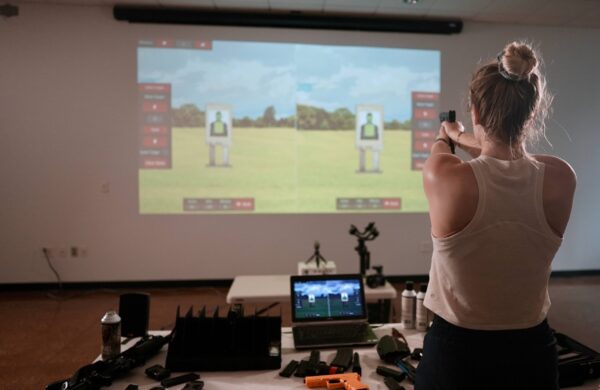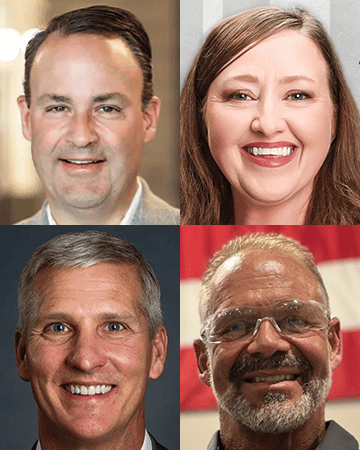6 Burning Questions
For 2024
Turmoil makes for interesting times in this industry. And 2024 is shaping up to be one of those years where uncertainty has the potential to take us in a wide range of directions.
Another U.S. presidential election looms on the horizon. Depending on the outcome, leadership changes could spur the return of civil unrest, new gun laws and fear-based buying sprees. But before we even get there, we’ll be dealing with potential fallout from ongoing conflicts in the Middle East and Ukraine, congressional upheaval and an uncertain economy.
As always, forecasting where the year will take us is difficult at best. We’ve asked a trio of gun shop leaders to give it their best shot. Our panelists: Mike Rust, general manager of H&H Shooting Sports in Oklahoma City; Jonathan Solomon, co-owner of Redstone Firearms in Burbank, Calif.; and Larry Hyatt, owner of Hyatt Guns in Charlotte, NC.
1. Market Volatility’s Impact On Sales?
It’s become more difficult to predict and prepare for economic changes in the industry. Hyatt argued dealers can’t afford to not be paying attention to the world around us.
“Everybody in the gun business needs to keep their ears on the news,” he advised. “Because it affects us so much, whether it’s crime or a potential gun law or international news.”
It also means being prepared for chaos. If you wait until bad news hits, you’ll be competing with every other store for limited supplies.
“We have what we call ‘social unrest’ inventory. You better have it, because law enforcement needs it, and citizens need it. So, you have to have some ammunition stocked up,” Hyatt continued.
According to Rust, sales started slowing down over the summer, but the situation in Israel demonstrated the ability of seemingly unrelated world events to spark buying here in the U.S. This was due, at least in part, to rumors of potential Middle Eastern terrorists slipping across our southern border.
“My thought is that growth is going to continue probably through the election,” he said. “But it depends on what happens in Israel on whether fear buying is going to continue.”
Regardless, we may not see a significant surge in handgun buying.
“People already have them. Now, it’s time for rifles. They’re stocking up on 5.56 ammo and AR-15s are starting to disappear from the shelves,” Rust added.
While turmoil may spark buying across the country, there are often different factors at play in California. In this case, a new 11% sales tax on ammo and firearms is set to take effect in July.
“We can have a great financial year with the volatility of the industry, but we’re also going to
get hit with so many different fees and new laws,” Solomon pointed out. “So, it’s going to kind of be a wash for us here in California. When it comes to local politics, we’re battling a war we can’t win.”
2. What Are The Most Exciting Trends?
When asked to name the trend he’s most excited about, Rust was quick to highlight double-stack 1911s, like Springfield Armory’s new Prodigy.
“There are some smaller companies giving it a go as well. And I believe you’re going to see it
from some of the major players,” he said.
Given the restrictions imposed by California’s handgun roster, it can be tough for gun buyers in the state to enjoy some of the newer trends. Instead, customers are forced to focus on unregulated products like holsters and gadgets used to store guns in cars.
“That’s what we’re seeing right now, which is great, because we make more profit on those type of products,” Solomon noted.
During and after the pandemic, there wasn’t a lot of innovation coming from manufacturers. This is slowly changing. Among the most welcome is the trend toward smaller semi-autos with easy-to-manipulate slides.
“Thank goodness for that,” Hyatt said, “because it doesn’t work having to deal with products
designed for 19-year-old Marines, and then trying to get those products in the hands of a 65-year-old female.”
3. How Will Legal Challenges To Anti-Gun Laws Impact Sales?
There are a number of significant legal disputes being put forward by pro-2A organizations in courts across the country. Among the most closely watched fights concern the regulation restricting the use of pistol braces.
For a short time, customers were able to use a brace as a quick and less expensive way to own a short-barreled rifle. That equation changed when the ATF revisited the issue, leaving retailers with inventory for which there is now no demand.
“We’re still waiting to see what’s going to happen with those lawsuits,” Rust said. “I’ve still got a lot of money invested in rifle-caliber pistols I can no longer sell. And I have no doubt there are other retailers out there who have a large amount of inventory in this kind of item.”
There’s also the potential for new laws requiring background checks for all gun sales — including private transfers. There will be income opportunities if that happens. It’s something H&H already does for people who prefer background checks before selling a gun to someone.
“We probably do one a week. If it becomes law, I can see turning into a much larger number,” Rust predicted.
The uncertainty around court challenges is a good reason to take a conservative approach in terms of any inventory purchasing decisions that hinge on final rulings, Hyatt suggested.
“We’re going to wait to see what happens. Some of this is bad for business — these long, drawn-out court cases. But sometimes it makes people buy now because they worry they won’t be able to get something later,” he relayed.
4. Are First-Time Buyers Still A Force?
The industry welcomed millions of first-time gun buyers in the first two years of the pandemic. Rust said the problem facing dealers today isn’t welcoming them, but retaining them.
“The challenge isn’t getting those first-time shooters, it’s keeping them. We need to figure out a way to keep them better entertained and enthused with all shooting sports offers,” he noted.
It’s also important to remember customer service is key to helping those new shooters navigate an environment in which they may feel uncomfortable.
“We hire gun people to sell guns and we hire gun people to work the range. As longtime gun people, we feel like everybody should know what we know. The challenge we have, daily, with our team members is making sure they understand first-time gun people are asking questions because they don’t know. Part of our job is to be educators,” Rust said.
Solomon highlighted the importance of inclusivity.
“The bottom line is when it comes to inclusivity, especially in the African-American community, we’ve got to be able to feel like we’re wanted in that space,” he explained.
It’s also important to remember not every customer has $700 to $1,000 for their first gun.
“A lot of the people who we deal with have come from another store, where they feel like they were frowned upon when they said they had $500 to spend. We have to understand not everybody who walks in the door has the disposable income of the guy who just left after spending $3,000,” Solomon said.
Gun shops need to be more modern: think well-lit with clean bathrooms and friendly to all of their customers.
“What we don’t want is a grumpy guy at the gun shop who loves guns but hates people,” Hyatt stated. “Gosh, I’ve seen so many of those. They’re everywhere. The challenge is to get the right personality to give the customer good information without being arrogant or talking down to them.”
5. What Are The Biggest Threats?
There appears to be an increased strictness and lack of tolerance when it comes to following the ATF’s paperwork rules, Rust noted.
“The current administration has the ATF inspectors on a very short leash. Of course, the inspectors are going to report what they report. Now, the threshold to recommend loss of license has dropped considerably. It used to be a gross willful violation, like selling guns out the back door. Now it’s as simple as paperwork with a mistake on it. That mistake can cost your license and your livelihood,” he said.
According to Solomon, overreaction to shooting incidents threatens to put even more restrictions on gun rights.
“There’s this quick, heavy-handed legislation talk: ‘We need to outlaw this or outlaw that.’ All of these events are tragic and should not have occurred,” he said. “But legislation is only for those who are going to break the law. People who are going to go out and shoot up a school or house don’t give a damn about legislation. They don’t give a damn about the law. Because if they did, they wouldn’t do what they were doing.”
Among the hidden threats to every gun store is the potential for loss of liability insurance, particularly in light of talks about taking away some of the product liability protections that shield firearms manufacturers, importers and retailers.
“If we can’t get liability insurance at a reasonable cost, it could put a lot of us out of business. It’s a huge risk for any of us who have capital invested. It’s not talked about, but it is very frightening,” Hyatt conveyed.
6. How Will 2023’s Events Impact 2024?
By the latter part of 2023, handgun sales had largely slowed, compared specifically to the previous two years. Rust predicts that slowdown is likely to continue, at least into the first part of the year.
“I think it has to do with the fact we saw such a boom in handgun sales in the past two or three years. It’s almost the industry returning to normal. So, until things normalize back to 2019, I think we’re going to continue to see a longer dip in handguns,” he said.
Redstone Firearms has a heavy emphasis on education and training classes. Solomon has been disturbed recently to see so many inexperienced private instructors popping up out of nowhere — which risks creating a bad impression for new shooters who are trying to learn the basics in a safe setting.
“They’re there to get a better understanding of what to do and how to do it. When you have instructors who don’t understand this, it makes it hard for those new shooters to come back and help the industry in a positive way. If they have a bad experience, they’ll think all instructors are that way,” Solomon reasoned.
To Hyatt, there’s little reason to expect a change in the tepid sales pace of the latter part of 2023. Of course, it could be altered by social unrest, war or something similar.
“It looks to me like next year is going to be a continuation. There’s going to be lower demand. And stores better have a good selection because nobody wants to drive to a physical store if they don’t have products,” he concluded.
What are your new year predictions? Drop us a line: editor@shootingindustry.com.





